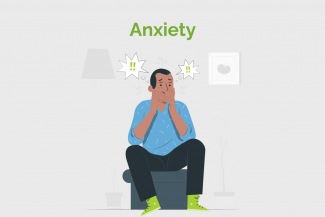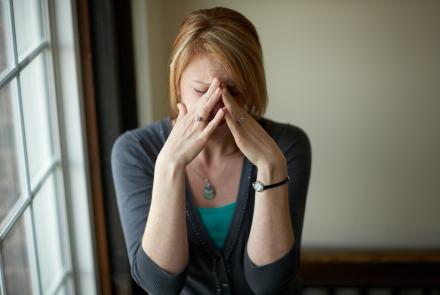
Anxiety Disorder can be caused by some of the following:
Family history: People who experience anxiety often have a history of mental health problems in their family. However, this doesn't mean that a person will automatically develop anxiety if a parent or close relative has had a mental illness.
There is a two to threefold greater risk of having this disorder if a first-degree relative has the disorder.
Ongoing stressful events: Stressful events can trigger symptoms of anxiety. Common triggers include:
- Job stress or job change
- Change in living arrangements
- Pregnancy and giving birth
- Family and relationship problems
- Major emotional shock following a stressful or traumatic event
- Verbal, sexual, physical or emotional abuse or trauma
- Death or loss of a loved one
Physical health problems: Continuing physical illness can trigger anxiety or complicate the treatment of either the anxiety or the physical illness itself.
Common conditions that can do this include:
- Hormonal problems (eg overactive thyroid/ hyperthyroidism/diabetes): Hormones are the chemical messengers that travel in the bloodstream to organs and tissues. Hormone activity is responsible for a variety of physical and psychological reactions, including anxiety. Hormones are responsible for nearly every process in the body and the body gets used to a very specific amount of each hormone. Hormonal imbalances are an issue that can be physical and natural, or caused by stress, or both, and no matter what causes it can lead to anxiety.
- Asthma: This is a potentially dangerous condition that is caused by obstruction of the airways due to inflammation. Asthma and shortness of breath are common triggers of panic attacks, and can play a very strong triggering role in the development of long-term anxiety issues.
- Hypoglycaemia: This occurs when there is not enough glucose in the body, starving the brain. Low blood sugar is more likely to make the current anxiety symptoms worse, rather than create anxiety symptoms themselves.
- Heart disease: Anxiety disorders won’t cause a heart attack on their own, but anxiety puts extra strain on the heart. Long term stress (from anxiety attacks) can damage the body, including the heart. Those who have a heart problem and also suffer from panic attacks may be at greater risk of a heart attack.
Anxiety may have an association with the following heart disorders:
- Rapid heart rate (tachycardia)
- Increased blood pressure
- Decreased heart rate variability
Anxiety attacks can feel like a heart attack. Here’s how to tell the difference:
Firstly, have your heart tested and ensure it is in good shape. Be aware of the minute differences between anxiety and heart attack, for example:
- Chest pain from anxiety tends to be more localized and sharp, while heart attacks radiate and are often duller.
- Panic attacks rarely cause vomiting - a somewhat common symptom of heart attacks, although not in all of those that experience one.
- Panic attacks tend to be more systematic. They generally peak about 10 minutes in and then there is a slow and steady decline. Heart attacks can follow this same pattern, but it's less common.
Person’s habit history: Heavy or long-term use of substances such as alcohol, cannabis, amphetamines or sedatives can cause people to develop anxiety, particularly as the effects of the substance wear off. People with anxiety may find themselves using more of these substance to cope with withdrawal-related anxiety, which can lead to them feeling worse.
Personality factors, for example:
- Extremely analytical
- Emotionally sensitive
- Over reacts
- Sensitive to criticism
- Low self-image
- Need to appear in control at all times
- Obsessive thinking
- Inner nervousness
- High expectations
- Easily irritated
- Worrier
- Sensitive to negative stimuli
- Often, never feels “good enough”
- Easily hurt
- Prone to guilt
- Tends to be a pleaser
- Avoids conflict
- Overly concerned about others’ opinions
- Excessive fear of failure
- Excessive fear of health issues
- Works very hard to appear together
- Worries about being embarrassed










